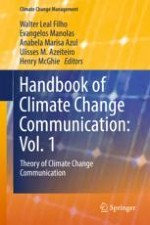2018 | OriginalPaper | Chapter
Feeling the Heat: The Challenge of Communicating ‘High-End’ Climate Change
Author : Tim Rayner
Published in: Handbook of Climate Change Communication: Vol. 1
Publisher: Springer International Publishing
Activate our intelligent search to find suitable subject content or patents.
Select sections of text to find matching patents with Artificial Intelligence. powered by
Select sections of text to find additional relevant content using AI-assisted search. powered by
